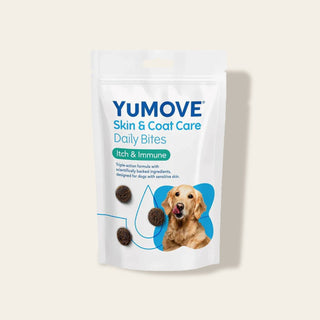

Cancer in dogs: The warning signs
World Cancer Day, created in 2000, is a worldwide initiative held every year on 4th February, and aims to raise awareness, improve education and unite the globe into working together to help those suffering with cancer. It also brings awareness to the shortcomings of cancer treatment internationally.
With that in mind, we thought we’d shed some light on some of the most common signs and causes of cancer in dogs – and what you should do if you’re worried about your pet. Let’s take a closer look…
Cancer in dogs
Unfortunately, cancer is one of the most common illnesses in dogs. It’s said that 50% of all dogs over the age of 10 will be diagnosed with some form of cancer. Which makes recognising the warning signs even more vital if you’re dealing with an ageing pup. By doing this – along with providing age-appropriate exercise, a nutritional diet and mental simulation – you can keep your dog active for as long as possible.
The most common types of dog cancer
Did you know that dogs and humans can actually develop the same types of cancer? This list isn’t exhaustive, but it should give you a rough idea on the most common types of dog cancer in the UK:
- Skin cancer
- Blood cancer
- Bone cancer
- Cancers of the immune system – such as lymphoma
- Abdominal cancers
- Cancer of the uterus
- Mammary (breast) cancer – mainly found in female dogs
- Testicular cancer
- Anal cancer
The causes of canine cancer

Cancer – in both humans and dogs – is complex. Therefore, the cause isn’t definitive. But it can be triggered by genetics, age, the environment and nutrition. On a positive note, animal experts have determined that cancer can’t be caused by certain things – specifically physical injuries, like bumps and scrapes. Read on to take a deeper look into some of the most common causes of cancer…
1. Genetics
Just like in humans, the cause of cancer can sometimes be inherited. This means that if your pet’s doggy parents developed cancer, your dog is more likely to as well. Plus, in general, some breeds of dog are more prone to certain illness – like joint stiffness. For instance, Golden Retrievers, Boxers and Rottweilers are more likely to develop cancer (and particular types of cancer) than other breeds.
2. Carcinogens
Simply put, carcinogens are substances or exposures that can cause cancer. Carcinogens include UV rays from the sun, second-hand smoke, insecticides used in agriculture, some viruses and air pollution.
Researchers have found that exposure to the sun is a significant factor in developing squamous cell carcinoma, a cancerous tumour that can be seen in almost every single domesticated pet breed. And animals with white fur or markings are more likely to develop this form of cancer.
3. Age
Sadly, cancer is one of the leading causes of death in dogs over the age of 10, with 50% of older dogs developing the disease and approximately one in four dogs passing from it. However, the reasons for this are largely speculated.
4. The environment
In humans, the majority of cancers are related to environmental factors around them or in their diet. Therefore, we can assume that these same risks also play a part in the development of canine cancer.
Known carcinogens (see above) can directly contribute to the development of cancer in pets. And it’s been proven that environmental carcinogens – like cigarette smoke – can contribute to the development of cancer in the mouths of cats and dogs. So, depending on your dog’s environment, they may be more or less exposed to certain risks.

What could help prevent your dog from getting cancer?
One thing you could consider is spaying and neutering. Spaying or neutering your dog could prevent ovarian and testicular cancers from developing. Studies have also shown that spaying a female dog before her first or second heat may also help to reduce the risk of breast cancer developing. You should talk to your veterinarian about the best time for your dog to be spayed or neutered, according to their breed.
Keeping your dog’s mouth clean and healthy may also reduce the risk of oral cancer.
As well as trying to reduce your dog’s risk of cancer, you should educate yourself on the warning signs, so your veterinarian can catch and treat it early.
What are the warning signs of cancer in dogs?

Unfortunately, your furry friend can’t tell you when something’s wrong. Being able to spot the early warning signs of cancer is key in its prevention and treatment. Although there’s not one symptom to look out for, if you notice one or more of these potential warning signs, we recommend reaching out to your vet:
1. Tumours, lumps or unusual growths
Although this is the most commonly thought of sign of cancer, it’s important to note that not every single tumour is cancerous. There are two types of tumours:
- Malignant tumours. This type is cancerous. They grow very quickly and spread around the bodily easily.
- Benign tumours. This type is not cancerous. They typically grow very slowly and don’t tend to spread around the body. Usually, benign tumours are harmless. Problems only occur if the tumour gets in the way of other body parts or organs.
You should also be on the lookout for swollen lymph nodes. Fortunately, they don’t cause pain, but they can be a sign of lymphoma – which is a form of cancer commonly found in breeds like Golden Retrievers. Any unusual lumps or bumps on your dog should be examined by your vet – especially if they’re fluctuating in size, shape or appearance.
2. Wounds that won’t heal
As with humans, small wounds and lesions in dogs should heal over time. You can tell if a wound is healing if you can see scabbing or skin and hair regrowth. If your dog has a wound that just isn’t healing, you should reach out to your vet as soon as possible.
3. Abnormal bleeding
Bleeding is a cause for concern in general. But it’s especially concerning if you notice bloody eye discharge or bleeding from the nose – as this is a common sign of eye and skin cancers.
Unusual bleeding from the mouth is often the first indication of an oral tumour, which can often go undetected. That’s because people assume that bad breath and discharge in the mouth is a normal sign of ageing. But you should always get these types of things checked out by a vet.
4. Lameness
If you’re not sure what this means, lameness is just a change in how your dog walks – whether that’s slowing down, limping or favouring a certain limb. This sort of pain when walking can be an early sign of bone cancer.
Having said that, if your dog is older or dealing with joint stiffness, you shouldn’t worry about every single snag in their step. But if you see a sudden change or persistent lameness, then they need to be evaluated by your vet.
5. Sudden weight loss or gain
Weight loss is frequently seen in dogs with cancer. Similarly, sudden weight gain in dogs can also be a sign of canine cancer. If you see any sudden changes in your dog’s weight you should contact your vet right away.
6. Lethargy and lack of enthusiasm to exercise
As dogs age, they slow down. Sadly, this is unavoidable. On the other hand, a sudden or unexplained lack of energy is often the first sign of many illnesses, not just cancer. Lethargy is different from simply being tired due to old age. Although older dogs can tire easily, they are often just as enthusiastic about playing and walking as their puppy counterparts.
But if your dog suddenly loses interest in going for walkies, stops greeting you at the door, or simply doesn’t want to pay with their favourite toy, this is lethargy. Other signs of lethargy include too much sleep and delayed responses to things like commands and loud noises.
7. Unusual poo
If you’ve had your dog for years, you probably know what’s normal and what’s not when it comes to their toilet habits. Unusual poos can be the first sign of many different illnesses. Take a look at this guide to find out what your dog’s poo tells you.
In particular, you should be on the lookout for bloody or black, tarry stools, or diarrhoea – these are often a sign of ulcers, but can sometimes indicate mast cell tumours.
What to do if your pet is showing warning signs

Cancer can be life-threatening, so it’s important to contact your vet straight away if you have any worries or suspicions. They’ll likely run a number of tests, like X-rays, ultrasounds and blood tests, to determine what’s wrong and so they can rule out any other health conditions.
Early detection is the key to treating cancer, and therefore giving your dog an active life, for life. And even if it’s not the big ‘C-word’, these signs could mean your dog is suffering from another health issue that needs treatment.
The good news?
There’s no two ways about it, a cancer diagnosis is heartbreaking. But it doesn’t mean you should have to live in fear. Every single year, dogs are living longer and longer – which just goes to show how far pet care and veterinary medicine has advanced.
In fact, nowadays there are more options than ever. Treatments such as surgery, radiation therapy and chemotherapy are readily available. And, as we said before, early detection vastly improves your dog’s chances of living a long, happy, healthy and active life.
Think your dog is showing any of these common signs of cancer? It’s best to get in touch with your vet. And, if you’re not doing so already, annual visits to the vet are essential. Looking for more health-related advice? Check out how to spot the signs of dementia in dogs, or take a look at our guide to canine joint stiffness.




